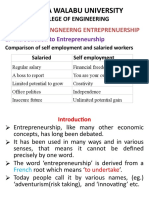0 ratings0% found this document useful (0 votes)
74 viewsChapter One: The Concept of Entrepreneurship and Entrepreneur
Chapter One: The Concept of Entrepreneurship and Entrepreneur
Uploaded by
kebaman1986The document discusses the concepts of entrepreneurship and entrepreneur. It defines entrepreneurship as creating something new with value by devoting time and effort while assuming risks. An entrepreneur is an innovator who recognizes opportunities and acts to implement ideas. The document outlines the evolution of these concepts over time and common characteristics of successful entrepreneurs such as the ability to take risks, be innovative, show initiative, and learn from failures. It also categorizes types of entrepreneurs based on the business type and use of technical skills.
Copyright:
© All Rights Reserved
Available Formats
Download as PDF, TXT or read online from Scribd
Chapter One: The Concept of Entrepreneurship and Entrepreneur
Chapter One: The Concept of Entrepreneurship and Entrepreneur
Uploaded by
kebaman19860 ratings0% found this document useful (0 votes)
74 views32 pagesThe document discusses the concepts of entrepreneurship and entrepreneur. It defines entrepreneurship as creating something new with value by devoting time and effort while assuming risks. An entrepreneur is an innovator who recognizes opportunities and acts to implement ideas. The document outlines the evolution of these concepts over time and common characteristics of successful entrepreneurs such as the ability to take risks, be innovative, show initiative, and learn from failures. It also categorizes types of entrepreneurs based on the business type and use of technical skills.
Original Title
Entrepreneurship CH 1
Copyright
© © All Rights Reserved
Available Formats
PDF, TXT or read online from Scribd
Share this document
Did you find this document useful?
Is this content inappropriate?
The document discusses the concepts of entrepreneurship and entrepreneur. It defines entrepreneurship as creating something new with value by devoting time and effort while assuming risks. An entrepreneur is an innovator who recognizes opportunities and acts to implement ideas. The document outlines the evolution of these concepts over time and common characteristics of successful entrepreneurs such as the ability to take risks, be innovative, show initiative, and learn from failures. It also categorizes types of entrepreneurs based on the business type and use of technical skills.
Copyright:
© All Rights Reserved
Available Formats
Download as PDF, TXT or read online from Scribd
Download as pdf or txt
0 ratings0% found this document useful (0 votes)
74 views32 pagesChapter One: The Concept of Entrepreneurship and Entrepreneur
Chapter One: The Concept of Entrepreneurship and Entrepreneur
Uploaded by
kebaman1986The document discusses the concepts of entrepreneurship and entrepreneur. It defines entrepreneurship as creating something new with value by devoting time and effort while assuming risks. An entrepreneur is an innovator who recognizes opportunities and acts to implement ideas. The document outlines the evolution of these concepts over time and common characteristics of successful entrepreneurs such as the ability to take risks, be innovative, show initiative, and learn from failures. It also categorizes types of entrepreneurs based on the business type and use of technical skills.
Copyright:
© All Rights Reserved
Available Formats
Download as PDF, TXT or read online from Scribd
Download as pdf or txt
You are on page 1of 32
Chapter One
The Concept of Entrepreneurship
and Entrepreneur
Meaning and Definition of
entrepreneurship
I. Entrepreneurship is the process of creating something new with value
by devoting the necessary time and effort, assuming the
accompanying financial, Psychic and social risk and Receiving the
resulting rewards (money, personal satisfaction and independence).
• From the above definition, we can understand that;
1) Entrepreneurship involves the creation process.
i.e creating something new of value
2) Entrepreneurship requires the devotion of the necessary time
and effort.
3) It involves the rewards of being entrepreneur .
i.e *Money-for profit oriented entrepreneurs
* Independence
* personal satisfaction
4) Assuming necessary risk is the final
aspect of entrepreneurship
II. Entrepreneurship is a French word literally
translated as between taker or go-between.
• The concept Entrepreneurship has evolved
over time and has always a subject to
modification.
Entrepreneurship in the Earliest period
• An entrepreneur was viewed as a go-between
• A person who sign contracts with a money
person.
Eg. Marco Polo
Entrepreneurship In the Middle Ages
• a person who managed large production
projects using the resource provided by the
government of the country.
Eg. The Cleric
Entrepreneurship in the17th century
• a person who entered in to a contractual
arrangement with the government to perform
a service or to supply products.
Entrepreneurship in 18th century
• The person with capital was differentiated
from the one who needed capital.
Eg. Thomas Edison
• Cantillon was the first to use entrepreneurship
in the business context. He considered
entrepreneurs risk takers because they buy at a
certain price and sell at uncertain price.
Entrepreneurship in 19th, 20th and 21st centuries
• By observing many economists view on
entrepreneurship the following common
behaviors of entrepreneurs are listed.
Entrepreneur is an individual that initiates and
actively operates an entrepreneurial venture.
It involves Innovation (changing, revolutionizing,
and introducing new approaches).
Entrepreneurship can take place in both profit and
non- profit environments
Entrepreneurship implies growth.
Uniqueness -it means doing something new,
something untested and untried-something
unique.
Creating Value- Through entrepreneurship, new
products, services, transactions, approaches,
resources, technologies and markets are created
that contribute something valuable to a
community or a marketplace.
Process- Entrepreneurship is not a one-time
phenomenon; it occurs overtime.
Who is An Entrepreneur?
- As stated by Hisrich and Peters (2008), the word entrepreneur is
derived from the French word ”enterprendre” meaning to
undertake.
- The entrepreneur- is the one who undertakes to organize,
manage and assume risks of a business.
- Entrepreneur- is an innovator or developer who recognizes and
seizes opportunities, converts those opportunities into
workable/ marketable areas, adds value through time, effort,
money or skill, assuming the risks of the competitive market
place to implement those ideas and realizes the reward from
these efforts.
- In simple terms, entrepreneur is an individual who takes risks
and starts something new or an individual developing something
unique.
5/14/2016 3:02 PM deguketema@gmail.com 9
Misconceptions about entrepreneurship
• Successful entrepreneurship needs only a great
idea.
• Entrepreneurship is easy.
• Entrepreneurship is a risky gamble.
• Entrepreneurship is found only in small
business reality.
The Entrepreneurial Decision Process
It is a movement from a present life-style to forming
a new enterprise.
• There are three process
1. Decision to change from present career or life
style.
• The two most important incentives to leave a
present life style are
- Working Environment and
- Disruption
The Entre…
2. The Decision that an Entrepreneurial Venture
is Desirable
• The perception that starting a new company is
desirable results from
- Culture
- Sub-culture
- Family
- Teachers
- Peers
The Entre…
3. The Decision that both Internal and External
Factors Make the Venture Possible
• The factors are
- Government
- Background
- Marketing
- Role Model
- Finance
The Entre…
• There are four process for the successful
establishment and management of the business.
1. Exploring the entrepreneurial context
2. Identifying opportunities and possible
competitive advantage
3. Starting the venture
• Researching the feasibility of the venture,
planning the venture, organizing the venture and
launching the venture.
4. Managing the venture
Competencies and traits of entrepreneurs
The common characteristics of entrepreneurs
are
- Need for Achievement - All rounded
- Willingness to take risk: - Self determination
- Self-Confidence - Flexibility
- Innovation - Tenancy despite
failure
- Commitment
Entrepreneurial Motivational Factors
The reasons /factors for small firm formation can
be divided between "Pull" and" Push" influences.
Pull Influence
• Some individuals are attracted towards small
business ownership by positive motive such as:
- Desire for independence
- Desire to exploit an opportunity
- Financial incentive
Push influence
• Many people are pushed into finding a new
enterprise by variety of factors including;
- Redundancy (Being without a job,
idleness)
- Unemployment
- Disagreement with previous employer
Characteristics of Entrepreneurs
• An entrepreneur is an individual who has a high level of ;
Administrative capability
Talent and ability for decision making
Communication skill
Organizational skill and
Technical knowledge
• Some of the most frequently cited competencies of entrepreneurs are;
a) Clear vision: identifying or determining where they want to be.
b) Clear objective: SMART objectives
c) Drive to achieve: entrepreneurs are internally driven by a strong desire to
compete, to excel against self- imposed standards and to pursue and attain
challenging goals.
d) Commitment: dedication to success and overcome obstacles.
e) Capacity to assume calculated risks : assuming the responsibility for loss
that may occur due to unforeseen contingencies of the future.
- They assumes all possible risks of running business, which emerges due
to the possibility of changes in the tastes of consumers, technology,
techniques of production and new invention.
- Successful entrepreneurs have special ability to reduce risks by their
initiative, skill and good judgement.
5/14/2016 3:02 PM bogalealemu2000@gmail.com 18
Continued…
f) Initiative taking: they actively seek and take the initiatives.
i.e.- being responsible for the success and failure of the operation.
- taking the initiative in solving a problem or filling the vacuum
where no leadership exist.
g) Opportunity orientation: having analytical ability to analyze an
opportunity, a problem or situation.
- They focuses on opportunities rather than on resources,
structures or strategy.
h) Persistent problem solving
i) Self-confidence: successful entrepreneurs have internal locus of
control, they believe in themselves.
- They do not believe in fate or luck.
- Their self-confidence increases their feeling of being
independent.
5/14/2016 3:02 PM bogalealemu2000@gmail.com 19
Continued…
j) Seeking feedback and networking: effective
entrepreneurs are often described as quick learners,
seeking information aggressively from others.
- They have strong desire to know how well they are
doing and how they might improve their performance.
- They maintains sustainable network with investors,
partners and employees.
k) Tolerance of uncertainty and failure: effective
entrepreneurs uses failure as learning experience.
- They do not become disappointed, discouraged or
dispersed by the failure.
l) Creativity and innovativeness: innovation implies
doing new thing or doing of things that are already
being done in a new way.
5/14/2016 3:02 PM bogalealemu2000@gmail.com 20
Some Success and failure factors of
entrepreneurship
• The entrepreneurial team
• Venture product or service
• Markets and timing
• Business ideology
Types of entrepreneurs
• There are different bases to classify
entrepreneurs, some of them are
Based on the type of Business
According to the type of business, entrepreneurs
are classified as follows:
1. Business entrepreneurs are individuals who
conceive an idea for a new product or service
and then create a business to materialize their
idea in to reality.
2. Trading entrepreneur is one who undertakes
trading activities and is not concerned with the
manufacturing.
3) Industrial entrepreneur is essentially a
manufacturer who identifies the potential needs
of the customers and tailors a product or service
to meet the marketing needs.
4. Corporate entrepreneur is a person who
demonstrates his innovative skill in organizing
and managing corporate undertaking.
5. Agricultural entrepreneur is the entrepreneur
who undertakes agricultural activities such as
raising and marketing of crops.
Based on technology(use of skill)
1. Technical entrepreneur is a "Crafts man" with
skill in production techniques.
2. Non-technical entrepreneur is a person who is
concerned with developing alternative
marketing and distribution strategies to
promote his/her business.
3. Professional entrepreneur is a person who
is interested in establishing a business but
does not have interest in managerial or
operating it once it is established.
Entrepreneurs based on Idea generation
1. Technological entrepreneur is one who
invents a new technology to produce new
products or new process for producing old
product.
2. Geographical entrepreneur is one who moves
technology, products, and processes that go
with it from one place to another. It is
common to introduce new products or
services from more advanced nation to
developing nation.
3. Sociological entrepreneur- is one who finds a
new situation in which to sell an old product
(existing products).
Based on source of capital
Based on source of capital entrepreneurs can be
classified as;
1. Private entrepreneurs- is when an individual
on the basis of his or her own property start
up a new venture.
2. Collective entrepreneurs- when a venture is
created in a grouped based on collective
property or contribution.
Entrepreneurs based on the reason to start-up
Based on the reason to start-up, entrepreneurs can
be classified as follows:
1. Opportunity-driven entrepreneurs- they start a
company because they see clear market
opportunities to exploit.
2. Necessity-driven entrepreneur- goes in to
business to create self-employment and to win a
living.
Entrepreneurs Vs (Inventor, owner-manager,
Intrapreneurs)
• Entrepreneurs are more concerned with being
creative in using resources, they are less
concerned with managing resources efficiently.
• Owner-manger may or may not be entrepreneur,
they own and manage enterprises in a way, which
fits with their personal motivation.
• Innovators successfully exploit new ideas
( implement new ideas)
• Innovators to be called entrepreneurs they
must start a business using their innovation.
• Innovation is one characteristics of
entrepreneurs.
Benefits and Limitation of Entrepreneurship
From the benefits of entrepreneurship
Help to gain control over your own destiny.
Help to reach your full potential.
Help to get more profit.
Gives you recognition.
Opportunity to do things that you enjoy doing.
Benefits…
From the potential drawbacks of entrepreneurship
Uncertainty of income
Involves risk
- Financial risk - Family and social risk
- Career risk - Psychic risk
Working long hours
High level of stress
Complete responsibility
You might also like
- 31 - Puma's Challenge To Maintain Leadership in IndiaDocument6 pages31 - Puma's Challenge To Maintain Leadership in IndiashakeD0% (1)
- What Is Procurement ManagementDocument7 pagesWhat Is Procurement ManagementNaveed Chaudary100% (3)
- MuamalatDocument1 pageMuamalatmuhammad hilmanNo ratings yet
- Organization Structure PobDocument7 pagesOrganization Structure PobTishae Black100% (2)
- CH 3 ForecastingDocument20 pagesCH 3 Forecastingkebaman1986No ratings yet
- Entreprenuership 1,2Document74 pagesEntreprenuership 1,2Fikiru DubaNo ratings yet
- Entrepreneurship PPT (NEW), 2020Document163 pagesEntrepreneurship PPT (NEW), 2020pharmashinileNo ratings yet
- Entrepreneurship MaterialDocument85 pagesEntrepreneurship Materialashu tkNo ratings yet
- Entrepreneurship & Business Dev'tDocument35 pagesEntrepreneurship & Business Dev'tTariku MehdiNo ratings yet
- Chapter - 1Document26 pagesChapter - 1gawis17992No ratings yet
- Entrepreneurship Lecture Notes 2 (Chapter 1–5 wo2)-1Document187 pagesEntrepreneurship Lecture Notes 2 (Chapter 1–5 wo2)-1Mintesnot GetaNo ratings yet
- entrepreneurshipDocument35 pagesentrepreneurshipakliluasebotNo ratings yet
- Chapter 1Document24 pagesChapter 1Gebrekiros ArayaNo ratings yet
- Enterpership (1)Document102 pagesEnterpership (1)Ibrahim SirajNo ratings yet
- Entrepreneurship PPT EDITD 1-3 Latest 2018Document154 pagesEntrepreneurship PPT EDITD 1-3 Latest 2018kedir Abrahim100% (2)
- Entrepreneurship CH 1Document39 pagesEntrepreneurship CH 1meyu721No ratings yet
- Chapter 1Document39 pagesChapter 1yonasamare126No ratings yet
- Enterpreneurship Notes 01Document48 pagesEnterpreneurship Notes 01jimmy mlelwaNo ratings yet
- Chapter 1Document39 pagesChapter 1Fisseha AdhanomNo ratings yet
- Chapter 01 EntrepreneurshipDocument39 pagesChapter 01 EntrepreneurshipMeag GhnNo ratings yet
- Entrepreneurship: 6 Semester Session 2017-2021Document30 pagesEntrepreneurship: 6 Semester Session 2017-2021Khalid WaleedNo ratings yet
- Mechanical and Industrial Engineering Electrical and Computer Engineering (Control Stream)Document47 pagesMechanical and Industrial Engineering Electrical and Computer Engineering (Control Stream)Amanuel ChalchisaNo ratings yet
- Introdution To EntreprenuershipDocument27 pagesIntrodution To EntreprenuershipOld Oromo music museumNo ratings yet
- Develop Understanding of EntrepreneurshipDocument12 pagesDevelop Understanding of EntrepreneurshiphailayNo ratings yet
- ESP 221 Materials 2018 PublishedDocument59 pagesESP 221 Materials 2018 Publishedmimawi9161No ratings yet
- Enter CH 1 FinalDocument42 pagesEnter CH 1 Finalgosabeshir21No ratings yet
- Syllabus For The Course Entrepreneurship and Small Business ManagementDocument45 pagesSyllabus For The Course Entrepreneurship and Small Business ManagementBethelhem YetwaleNo ratings yet
- Chapter OneDocument30 pagesChapter Oneyomif tamiruNo ratings yet
- Entrepreneurship and Enterprise DevelopmentDocument200 pagesEntrepreneurship and Enterprise DevelopmentAsmamaw BekeleNo ratings yet
- Samara University College of Business and Economics: Department of Management EntrepreneurshipDocument54 pagesSamara University College of Business and Economics: Department of Management Entrepreneurshipfentaw melkie100% (1)
- CH 1Document37 pagesCH 1obsinaafilmakuushNo ratings yet
- Efbm-G6-Session 1Document49 pagesEfbm-G6-Session 1Tom BabuNo ratings yet
- Entrepreneurship SkillsDocument8 pagesEntrepreneurship Skillsvnarayan084100% (1)
- LU 2 EntrepreneurshipDocument35 pagesLU 2 Entrepreneurshippulemakau4No ratings yet
- CHAPTER 1 Enterprenuership For EngineersDocument20 pagesCHAPTER 1 Enterprenuership For EngineersJibril AdileNo ratings yet
- BBBBDocument240 pagesBBBBabdikena06No ratings yet
- Unit 1 EntrepreneurshipDocument24 pagesUnit 1 EntrepreneurshipJatin WadhwwaNo ratings yet
- EntrepreneurshipDocument88 pagesEntrepreneurshipNadeem Ganai100% (1)
- History: - History:: TH THDocument25 pagesHistory: - History:: TH THmkNo ratings yet
- Global Entreprenurship and IntrapreneurshipDocument5 pagesGlobal Entreprenurship and IntrapreneurshipErika L. PlazaNo ratings yet
- Project Management & Entrepreneurship KHU-702Document82 pagesProject Management & Entrepreneurship KHU-702Akriti Sonker100% (1)
- Entrepreneurship OUM: MPU 3223 - V2 & MPU 2222: Topic 1 Introduction To EntrepreneurshipDocument14 pagesEntrepreneurship OUM: MPU 3223 - V2 & MPU 2222: Topic 1 Introduction To EntrepreneurshipnannomansaranghaeNo ratings yet
- Enterprenurship FInalDocument148 pagesEnterprenurship FInalrajamritdas3No ratings yet
- Enterprenuership For For EngineersDocument233 pagesEnterprenuership For For Engineersnegash tigabu77% (13)
- Entrepreneurship in The New Millennium: Module - 01Document76 pagesEntrepreneurship in The New Millennium: Module - 01Lakshmi KsrinivasNo ratings yet
- Enter Ship 1Document29 pagesEnter Ship 1kussia toramaNo ratings yet
- Entrepreneurial Notes Cbet ClassDocument33 pagesEntrepreneurial Notes Cbet Classkambafelix22No ratings yet
- Entre Cha1Document60 pagesEntre Cha1Yeabsra AlemayehuNo ratings yet
- CH - 1Document35 pagesCH - 1jebinamokonen2No ratings yet
- Chapter OneDocument40 pagesChapter OneKalkidan NigatuNo ratings yet
- Chapter OneDocument43 pagesChapter Onekemelew AregaNo ratings yet
- ENT Update Notes s1Document46 pagesENT Update Notes s1nanastase41No ratings yet
- ED - Unit 1Document22 pagesED - Unit 1Harshita Kaushik AI002390No ratings yet
- UNIT - 4Document63 pagesUNIT - 4aarekelaNo ratings yet
- Reviewer in Entrep Mind.Document9 pagesReviewer in Entrep Mind.John Alpon CatudayNo ratings yet
- Entrepreneurship Topic 1Document14 pagesEntrepreneurship Topic 1Hui Xin TanNo ratings yet
- Entrepreneurship Guide ONEDocument10 pagesEntrepreneurship Guide ONE23578907k54No ratings yet
- chapter 1Document38 pageschapter 1manishkumartimsina123No ratings yet
- Chapter 01 EntrepreneurshipDocument42 pagesChapter 01 Entrepreneurshipኢትኤል ኢትዮጵNo ratings yet
- Unit 1 Introduction to Entrepreneruship.pptDocument22 pagesUnit 1 Introduction to Entrepreneruship.pptanshushrestha177No ratings yet
- Entre All PPTDocument222 pagesEntre All PPTTucho YadetaNo ratings yet
- Chapter 1Document20 pagesChapter 1shihan100% (1)
- Entrepreneurial Development in Education Institutions: Module TitleDocument141 pagesEntrepreneurial Development in Education Institutions: Module Title255 nenoNo ratings yet
- The Entrepreneurs Intended Learning OutcomesDocument6 pagesThe Entrepreneurs Intended Learning OutcomesAllyza Krizchelle Rosales BukidNo ratings yet
- The Path to Successful Entrepreneurship: Essential Steps for Building a StartupFrom EverandThe Path to Successful Entrepreneurship: Essential Steps for Building a StartupNo ratings yet
- Chemical Reactions: Çengel BolesDocument40 pagesChemical Reactions: Çengel Boleskebaman1986No ratings yet
- Chemical and Phase Equilibrium: Çengel BolesDocument22 pagesChemical and Phase Equilibrium: Çengel Boleskebaman1986No ratings yet
- Gas-Vapor Mixtures and Air-Conditioning: Çengel BolesDocument37 pagesGas-Vapor Mixtures and Air-Conditioning: Çengel Boleskebaman1986No ratings yet
- Gas Mixtures: Çengel BolesDocument18 pagesGas Mixtures: Çengel Boleskebaman1986No ratings yet
- Thermodynamic Property Relations: Çengel BolesDocument19 pagesThermodynamic Property Relations: Çengel Boleskebaman1986No ratings yet
- The Second Law of Thermodynamics: Çengel BolesDocument36 pagesThe Second Law of Thermodynamics: Çengel Boleskebaman1986No ratings yet
- Entropy: A Measure of Disorder: Çengel BolesDocument52 pagesEntropy: A Measure of Disorder: Çengel Boleskebaman1986No ratings yet
- Properties of Pure Substances: Çengel BolesDocument34 pagesProperties of Pure Substances: Çengel Boleskebaman1986No ratings yet
- Exergy: A Measure of Work Potential: Çengel BolesDocument30 pagesExergy: A Measure of Work Potential: Çengel Boleskebaman1986No ratings yet
- The First Law of Thermodynamics: Control Volumes: Çengel BolesDocument34 pagesThe First Law of Thermodynamics: Control Volumes: Çengel Boleskebaman1986No ratings yet
- The First Law of Thermodynamics: Closed Systems: Çengel BolesDocument38 pagesThe First Law of Thermodynamics: Closed Systems: Çengel Boleskebaman1986No ratings yet
- Refrigeration Cycles: Çengel BolesDocument24 pagesRefrigeration Cycles: Çengel Boleskebaman1986No ratings yet
- Project ManagementDocument44 pagesProject Managementkebaman1986No ratings yet
- Project ManagementDocument40 pagesProject Managementkebaman1986No ratings yet
- CH 2 Plant LayoutDocument28 pagesCH 2 Plant Layoutkebaman1986100% (1)
- Basic Accounting Principles and Budgeting FundamentalsDocument24 pagesBasic Accounting Principles and Budgeting Fundamentalskebaman1986100% (1)
- TwoPhaseFlow PDFDocument13 pagesTwoPhaseFlow PDFkebaman1986No ratings yet
- Workshop Tech 2Document7 pagesWorkshop Tech 2kebaman1986No ratings yet
- Lubrication SystemDocument43 pagesLubrication Systemkebaman1986100% (1)
- General Machine Shop SafetyDocument6 pagesGeneral Machine Shop Safetykebaman1986No ratings yet
- Case Study No Mod (Iv) Working Capital Turnover MethodDocument1 pageCase Study No Mod (Iv) Working Capital Turnover Methodamarlata_kumariNo ratings yet
- Kay Khaing Oo (MBF - 23)Document63 pagesKay Khaing Oo (MBF - 23)thweNo ratings yet
- CA Exam Preparation Guidelines by MahfuzDocument11 pagesCA Exam Preparation Guidelines by MahfuzssalmahfuzNo ratings yet
- National Accounts Transportation Logistics in Chicago IL Resume David BriggsDocument2 pagesNational Accounts Transportation Logistics in Chicago IL Resume David BriggsDavidBriggsNo ratings yet
- Ibm554 Slides c1-c8Document112 pagesIbm554 Slides c1-c8Backup kerjaNo ratings yet
- H, CSM: Summary of QualificationDocument4 pagesH, CSM: Summary of Qualificationkiran2710No ratings yet
- Lesson 3Document50 pagesLesson 3Angela MagtibayNo ratings yet
- Sap Logistics ExecutionDocument6 pagesSap Logistics ExecutionLokesh DoraNo ratings yet
- Arthi 201 CashDocument1 pageArthi 201 CashArvind RamachandranNo ratings yet
- JMCD1944 - Event Management Ans KeyDocument3 pagesJMCD1944 - Event Management Ans KeySHIVANo ratings yet
- Resume Abi A Tanz IlDocument1 pageResume Abi A Tanz Ils.ghoshNo ratings yet
- Module 7-Lessee Accounting - (OTHER ACCTG ISSUES)Document10 pagesModule 7-Lessee Accounting - (OTHER ACCTG ISSUES)Jeanivyle CarmonaNo ratings yet
- What Is Loss Prevention PDFDocument12 pagesWhat Is Loss Prevention PDFHarthwell CapistranoNo ratings yet
- Co Op Business Plan Template PDFDocument15 pagesCo Op Business Plan Template PDFIngle Satish100% (1)
- Case ToolKitDocument21 pagesCase ToolKitHenry Wang33% (3)
- SDE-Individual AssignmentDocument3 pagesSDE-Individual AssignmentParagNo ratings yet
- Canara - Epassbook - 2023-10-25 162605.252246Document20 pagesCanara - Epassbook - 2023-10-25 162605.252246vishalagnihotri.nwdNo ratings yet
- Report On Siddartha Bank LimitedDocument24 pagesReport On Siddartha Bank LimitedSanim AmatyaNo ratings yet
- CV Abdul GhafoorDocument3 pagesCV Abdul GhafoorAbdul Ghafoor KhatriNo ratings yet
- Charges: Company/LLP Master DataDocument1 pageCharges: Company/LLP Master DataPankaj Sanjay NagareNo ratings yet
- HR in ApexDocument24 pagesHR in ApexSalauddin SifatNo ratings yet
- RefrencesDocument6 pagesRefrencesMarwa ElghifaryNo ratings yet
- Bottled Water IndustryDocument8 pagesBottled Water IndustryAbhinav Pande100% (1)
- Iso Iwa - 2Document57 pagesIso Iwa - 2Vinay SrivastavaNo ratings yet
- MCQ On Budget and Budgetary Control - Multiple Choice Questions and Answers - Dynamic Tutorials and Services PDFDocument4 pagesMCQ On Budget and Budgetary Control - Multiple Choice Questions and Answers - Dynamic Tutorials and Services PDFMuhammad Khubaib Khan83% (6)
- Strategic Consequences of Retail Acquisition: IKEA and HabitatDocument11 pagesStrategic Consequences of Retail Acquisition: IKEA and HabitatKhanh Linh HoangNo ratings yet














































































































